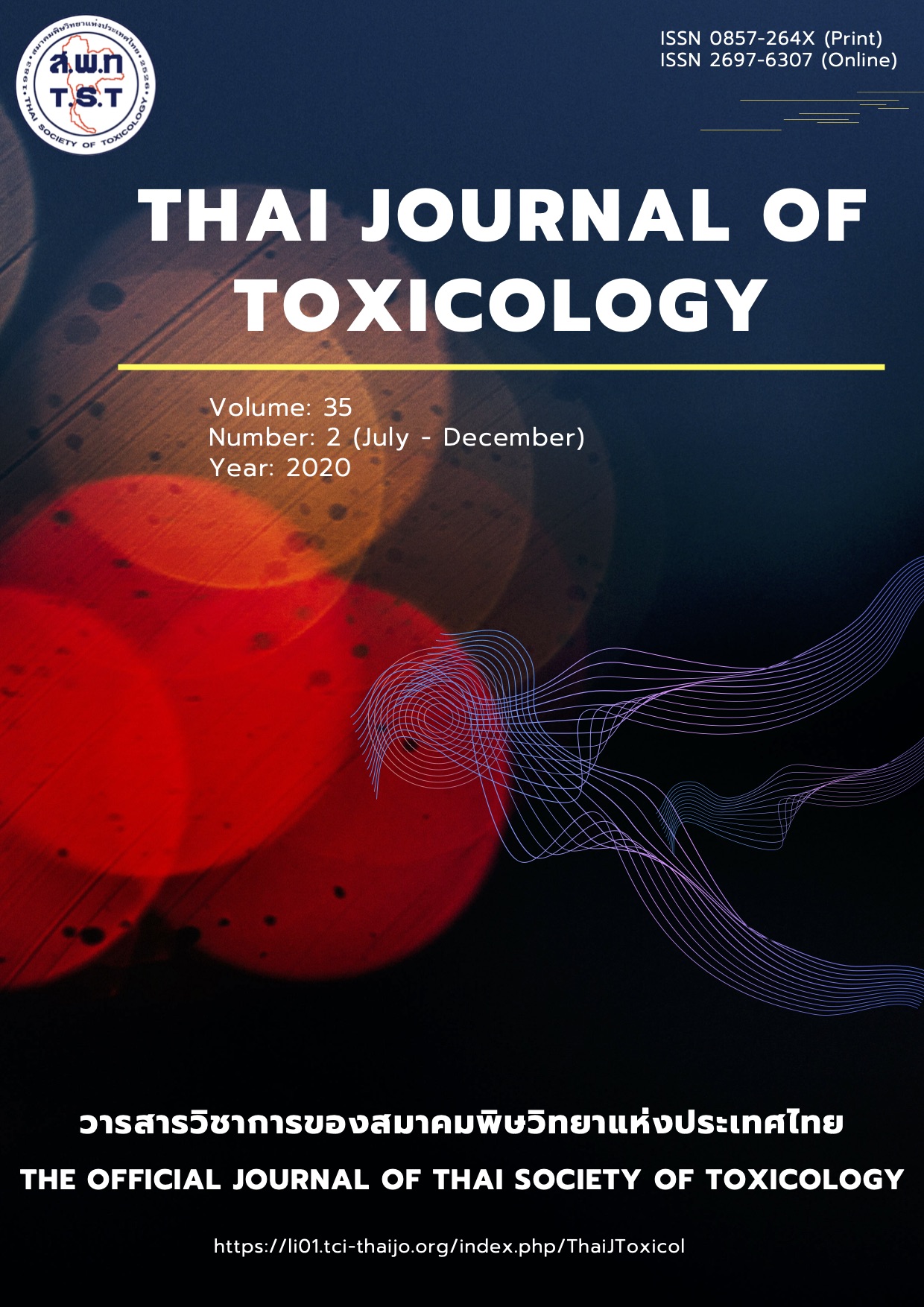ผลของโพรไบโอติกส์ และซินไบโอติกส์ในการป้องกันการเกิดพิษต่อตับจากพาราเซตามอลในเซลล์ HepG2
Main Article Content
บทคัดย่อ
อะเซตามิโนเฟน (APAP) หรือพาราเซตามอล ยาบรรเทาอาการปวดและลดไข้ สามารถทำให้เกิดความเป็นพิษต่อตับได้หากใช้ในขนาดสูงหรือติดต่อกันเป็นเวลานาน การศึกษานี้มีวัตถุประสงค์เพื่อศึกษาผลของโพรไบโอติกส์ และซินไบโอติกส์ในการป้องกันการเกิดความเป็นพิษจากพาราเซตามอลต่อตับโดยการให้สารที่ได้จากการทำให้โพรไบโอติกส์แตกตัว (Intracellular Fraction of Probiotics: IFP) จากโพรไบโอติกส์ 3 สายพันธุ์คือ Bifidobacterium longum subsp. longum TISTR 2195, Lactobacillus bulgaricus TISTR 451 หรือ Streptococcus thermophilus TISTR 458 แก่เซลล์ HepG2 ที่ได้รับพาราเซตามอล (25 mM; IC50) พบว่า IFP ของ S. thermophilus TISTR 458 สามารถชะลอการยับยั้งการเจริญเติบโต และลดการบาดเจ็บของเซลล์ HepG2 ที่เกิดจากพาราเซตามอลโดยลดการปล่อยเอนไซม์แลคเตทดีไฮโดรจีเนส เพิ่มระดับรีดิวซ์กลูตาไธโอน ลดการทำงานของซุปเปอร์ออกไซด์ ดิสมิวเตส และจากการทดสอบฤทธิ์ต้านออกซิเดชันโดยวิธี ORAC พบว่า IFP ของ S. thermophilus TISTR 458 มีฤทธิ์ต้านออกซิเดชันที่สุด เมื่อทำการเลี้ยงในรูปแบบซินไบโอติกส์ พบว่า IFP ของซินไบโอติกส์ ช่วยเพิ่มประสิทธิภาพของ S. thermophilus TISTR 458 แสดงให้เห็นว่า IFP ของโพรไบโอติกส์ และซินไบโอติกส์ อาจมีประโยชน์ในการช่วยลดการเกิดความเป็นพิษต่อตับที่เกิดจากยาพาราเซตามอล
Article Details
เอกสารอ้างอิง
Kouam AF, Yuan F, Njayou FN, et al. Induction of Mkp-1 and nuclear translocation of Nrf2 by limonoids from Khaya grandifoliola C.DC protect L-02 hepatocytes against acetaminophen-induced hepatotoxicity. Front Pharmacol 2017; 8: 1–18.
Yoon E, Babar A, Choudhary M, et al. Acetaminophen-Induced Hepatotoxicity: a Comprehensive Update. J clin transl hepatol 2016; 4: 131–142.
Sharma S, Singh RL, Kakkar P. Modulation of Bax/Bcl-2 and caspases by probiotics during acetaminophen induced apoptosis in primary hepatocytes. Food Chem Toxicol 2011; 49: 770–779.
Yoon HJ, Zhang X, Kang MG, et al. Cytotoxicity evaluation of turmeric extract incorporated oil-in-water nanoemulsion. Int J Mol Sci 2018; 19: 1–12.
ไชยวัฒน์ ไชยสุต. ประวัติและนิยามของโพรไบโอติกส์. ใน: โพรไบโอติกส์ จุลินทรีย์ทางเลือกเพื่อสุขภาพ, พิมพ์ครั้งที่ 1. นนทบุรี: สำนักการแพทย์ทางเลือก กรมพัฒนาการแพทย์แผนไทยและการแพทย์ทางเลือก กระทรวงสาธารณสุข, 2556: 7-15.
Orellana E, Kasinski A. Sulforhodamine B (SRB) Assay in Cell Culture to Investigate Cell Proliferation. Bio-Protocol 2016; 6: 1-7.
Ramachandran E, Kalaivani P, Prabhakaran R, et al. Synthesis, X-ray crystal structure, DNA binding, antioxidant and cytotoxicity studies of Ni(II) and Pd(II) thiosemicarbazone complexes. Metallomics 2012; 4: 218–227.
Marí M, Cederbaum A. CYP2E1 overexpression in HepG2 cells induces glutathione synthesis by transcriptional activation of γ-glutamylcysteine synthetase. J Biol Chem 2000; 275: 15563–15571.
Mahakunakorn P, Tohda M, Murakami Y, et al. Effects of Choto-san and Its Related Constituents on Endogenous Antioxidant Systems. Biol Pharm Bull 2005; 28: 53–57.
Cedevit Centre de Développement de l'in-Vitro. Antioxidant capacity measurments. 2016. Available at http://labos.ulg.ac.be/cedevit/en/polyphenols-antioxydants/catalogueangl/mesure-de-capacite-antioxydante/, accessed on Dec 20, 2018.
BioTek Institution, Inc. Performing Oxygen Radical Absorbance Capacity Assays with SynergyTMHT, 2006. Available at http://www.biotek.com/resources/docs/ORAC_Assay_Application_Note.pdf, accessed on Dec 20, 2018.
Bio Rad. Bio-Rad Protein Assay, 2020. Available at http://www.bio-rad.com/webroot/web/pdf/lsr/literature/LIT33.pdf, accessed on Dec 20, 2018.
Odeyemi S, Dewar J. Repression of acetaminophen-induced hepatotoxicity in HepG2 Cells by polyphenolic compounds from lauridia tetragona (L.f.) R.H. Archer. Molecules 2019; 24: 1-18.
Niness KR. Nutritional and Health Benefits of Inulin and Oligofructose Inulin and Oligofructose : What Are They ?1. American Society for Nutritional Sciences 1999: 1402–1406.
Singh RS, Singh RP. Production of Fructooligosaccharides from Inulin by Endoinulinases and Their Prebiotic Potential. Food Technol Biotechnol 2010; 48: 435–450.
Kullisaar T, Zilmer M, Mikelsaar M, et al. Two antioxidative lactobacilli strains as promising probiotics. Int J Food Microbiol 2002; 72: 215–222.


